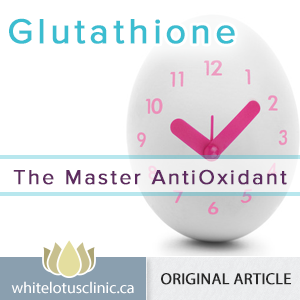Glutathione – The Master Antioxidant for Fertility, and For PCOS

Glutathione has been referred to as the “master antioxidant” and though it’s arguably the most important antioxidant out there, very few doctors know about it. Glutathione is produced by our own bodies (neat!), and is made up of three amino acids. It contains a whopping amount of sulfur, the compound that gives it much of its power. Glutathione can also be recycled, meaning that your body can use it over and over again. It’s main function is to quench all sorts of damaging chemicals that regularly float about in our bodies from inflammation and toxins. Each and every cell in our bodies need and use glutathione, and when it’s deficient, our health will suffer.
Genetics and Glutathione
Some people are naturally less able to recycle glutathione, due to their genes. We do offer testing for these genes in the clinic. For people who recycle less glutathione, there can be a much greater negative impact of toxins on our cells.

Glutathione and Fertility
Glutathione is important for both male and female fertility. It can improve sperm health and quality. When it comes to the women’s ovaries, glutathione has an important role to play. Our eggs develop slowly and gradually in a process known as folliculogenesis over a period of many months before ovulation occurs. During this process, the many cells surrounding the egg, known collectively as the follicle, replicate. Each one of these tiny cells requires glutathione to shield it from damage. As such, the egg quality is dependent on glutathione – one of the ovary’s main protectors.
In fact, research has shown that oocytes with higher levels of intracellular glutathione produce healthier, stronger embryos. Other research has shown that in our younger years, women’s ovaries actually have higher intracellular glutathione levels. As such, increasing our glutathione can potentially turn back the ovarian “clock”. Research has shown that glutathione deficiency is related to premature ovarian aging and even ovarian cancer. Another study found that for women undergoing IVF, higher levels of glutathione in a woman’s follicles translated into increased fertilization rates.
Glutathione and PCOS

For women with PCOS, glutathione is also exceptionally important. A recent study challenged a group of 36 lean women with PCOS with a load of glucose. As would be expected, the women produced higher levels of insulin and testosterone in response to the dose of sugar. The study concluded that the glucose caused a significant increase in the oxidative stress markers, lowering the glutathione levels – and that this reduction in glutathione was associated with an increase in testosterone.
Another study that set out to evaluate DNA damage in the ovaries of women with PCOS concluded that there may be significantly less glutathione in the ovary as a result of the condition. As many women with PCOS have seen when trying to conceive, egg quality is a key issue. Even for those women with PCOS who ovulate regularly, the time to conceive can be long – most often related to the quality of her follicles.
Glutathione is protective for the egg quality of women with PCOS and increasing these levels can not only improve the chances of conceiving but also can increase the general rate of ovulation.
So, How Do I Increase My Gluathione?
- As glutathione is a sulfur-rich compound, eating sulfur rich foods like onions, garlic, brocolli, kale, cabbage and bok choy will help increase your glutathione levels.
- N-Acetyl Cysteine is one of my favourite supplements for increasing intracellular glutathione. It’s anti-inflammatory, and is protective to the cells in our bodies.
- Alpha Lipoic Acid is a great promoter of intracellular glutathione. It’s also wonderful for helping with blood sugar control and as such can be a great nutrient for women with PCOS.
- Selenium is a key mineral involved in the production of glutathione within our cells. Brazil nuts can be a great source of selenium, or alternately, organic forms of the supplement are best such as selenomethionine.
- Methylation is very important. If you have MTHFR or a genetic glutathione recycling deficiency this presents a challenge in keeping our antioxidant levels peaked. Using a L-5-methyltetrahydrofolate instead of folic acid, and ensuring we have optimal B12 in the form of methylcobalamin, and vitamin B6 in P-5-P form are key in helping with these pathways.
- Glutathione supplements are controversial. However in recent years liposomal glutathione has hit the market. Liposomal glutathione is one of the few forms of glutathione that can enter our cell membranes, as regular glutathione supplements are degraded in the gut.
References
- Irvine DS. Glutathione as a treatment for male infertility. Rev Reprod. 1996 Jan;1(1):6-12. Review.
- Mukherjee A, Malik H, Saha AP, Dubey A, Singhal DK, Boateng S, Saugandhika S,Kumar S, De S, Guha SK, Malakar D. Resveratrol treatment during goat oocytes maturation enhances developmental competence of parthenogenetic and hand-made cloned blastocysts by modulating intracellular glutathione level and embryonic gene expression. J Assist Reprod Genet. 2014 Feb;31(2):229-39.
- Kankofer M, Wawrzykowski J, Giergiel M. Sex- and age-dependent activity of glutathione peroxidase in reproductive organs in pre- and post-pubertal cattle in relation to total antioxidant capacity. Aging Clin Exp Res. 2013 Aug;25(4):365-70.
- Lim J, Lawson GW, Nakamura BN, Ortiz L, Hur JA, Kavanagh TJ, Luderer U. Glutathione-deficient mice have increased sensitivity to transplacental benzo[a]pyrene-induced premature ovarian failure and ovarian tumorigenesis.Cancer Res. 2013 Jan 15;73(2):908-17.
- Tola EN, Mungan MT, Uğuz AC, Naziroğlu M. Intracellular Ca2+ and antioxidant values induced positive effect on fertilisation ratio and oocyte quality of granulosa cells in patients undergoing in vitro fertilisation. Reprod Fertil Dev. 2013;25(5):746-52.
- Savic-Radojevic A, Bozic Antic I, Coric V, Bjekic-Macut J, Radic T, Zarkovic M, Djukic T, Pljesa-Ercegovac M, Panidis D, Katsikis I, Simic T, Macut D. Effect of hyperglycemia and hyperinsulinemia on glutathione peroxidase activity in non-obese women with polycystic ovary syndrome. Hormones (Athens). 2014 Nov 5.
- Lauver DA, Kaissarian NM, Lucchesi BR. Oral pretreatment with liposomal glutathione attenuates reperfusion injury in rabbit isolated hearts. J Cardiovasc Pharmacol. 2013 Mar;61(3):233-9.





